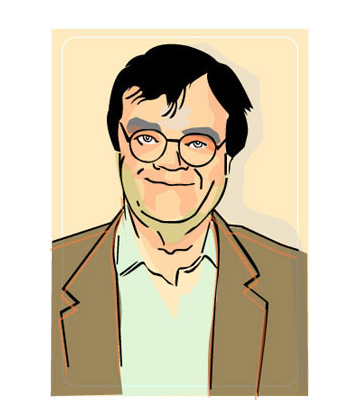The driest May in Minnesota since the Dust Bowl. Venerable GM slides into bankruptcy and you shudder for the old Pontiac dealers and the retirees in Michigan. In the middle of the night, an Airbus drops out of the air into the Atlantic Ocean and the veteran traveler shudders to think of it. And the posthumous John Updike appears in the bookstore, a book of short stories (“My Father’s Tears and Other Stories”) and his last poems, written by “my right hand … faithful old five-fingered beast of burden …
its labors meant
to carve from language beauty, that beauty which
lifts free of flesh to find itself in print.”
In the midst of these ominous rumblings, I went to a lovely party Saturday night, which is newsworthy because I stopped going to parties a long time ago because it’s boring to hear people talk about getting old, but then Saturday night there was this party and I went. A big brick manse on a quiet street, 30 people, half of them under 25, on a deck out back, hamburgers, fried chicken, chips, beer, wine, the usual repartee, and a lot of youth going on around us.
A boy and a girl with eager eyes, in the shadows, like badgers at a campsite. Three boys holed up with a video game. A beautiful coltish 16-year-old girl leaning around in a black strapless evening gown, trying out different personas (Dorothy Parker, Nancy Drew, Ava Gardner), who struck me as a reincarnation of Anne Frank. A teenage boy sitting with his nose in a book, making a great show of isolation. And an intensely quiet blond girl, a math whiz, who, with no reluctance, sat down at the piano when I asked her if she played piano, squared her shoulders and played the exquisite Chopin Prelude No. 2 in A minor, the notes of the slow movement like raindrops on birch leaves, smoke drifting by, an anguished old man pacing in the grass, and played it so beautifully it transformed the entire evening.
Transformation is no easy trick: It’s what art promises and usually doesn’t deliver. But she did. It was a difficult piece, and what she showed us was the intense poetry underneath her calm Lutheran exterior. She borrowed Chopin’s passion and made it her own, an astonishment, and then she stood up awkwardly and we all clapped and whooped. It was so much more than what we deserved to hear, which is true of art, a lavish gift of the heart that shames pretense by its outrageous generosity.
I went back to the crowd on the deck and had a piece of rhubarb pie with ice cream, feeling buoyed up by the performance, and still feel buoyant days later. The plane falls, the company slides, the good man is gone, the lawn turns brown, but with Chopin you come back to basics: Do I regret this life? Is it, despite all our brave words, a cheat and a waste? Does it make any slight difference to the universe that we are present?
What depresses me about the old-age monologue is the air of regret — Poor Me, I Am Unaccountably Sixty-Five, My Brain Is Leaking, My Legs Are Gone, Where Has It Gone, The Beauty And The Dream? — and what makes me love cities, despite the uproar, are the constant reminders of the generosity of life, the readers on the subway, the cheeses in the deli, the pictures in the gallery, the musicians in the park. The exuberant salad eaten on the sidewalk amid bus exhaust and the drawn faces of passersby.
Playing the Prelude No. 2 in A minor is not a step on a career path. There is only one Emanuel Ax, and he has the Chopin chair for now, and there are plenty of dead pianists around on CDs. I suppose that you could argue for a correlation between mastery of the Prelude No. 2 and scholastic achievement leading to opportunities in computer programming, but meanwhile, it simply is an extravagant gift from the heart of a girl to the hearts of whoever is standing nearby. Life is good, no matter the disappointments — O God the disappointments. Just square your shoulders and give them your utter best. As the late great Marilyn Monroe said, “I don’t want to make money, I just want to be wonderful.” Life is insurmountable, but we mount up every morning and ride forward. Thanks for being wonderful, dear heart.
(Garrison Keillor is the author of the Lake Wobegon novel “Liberty,” published by Viking.)
© 2009 by Garrison Keillor. All rights reserved. Distributed by Tribune Media Services, Inc.

